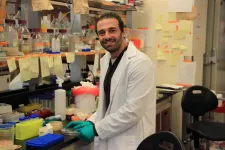Thicker-leaved tropical plants may flourish as CO2 rises, which could be good for climate
2021-04-01
(Press-News.org) How plants will fare as carbon dioxide levels continue to rise is a tricky problem and, researchers say, especially vexing in the tropics. Some aspects of plants' survival may get easier, some parts will get harder, and there will be species winners and losers. The resulting shifts in vegetation will help determine the future direction of climate change.
To explore the question, a study led by the University of Washington looked at how tropical forests, which absorb large amounts of carbon dioxide, might adjust as CO2 continues to climb. Their results show that multiple changes occurring in plants' leaves and competition between species could preserve these ecosystems' ability to absorb carbon dioxide from the atmosphere. The resulting paper was published Jan. 16 in Global Biogeochemical Cycles.
"Our findings suggest that plants with some types of responses, like making their leaves thicker, will ultimately grow better in tropical forests than their competitors," said senior author Abigail Swann, a UW associate professor of atmospheric sciences and of biology. "If these better-growing plants become more common in the forest, the total rates of water and carbon exchange could stay closer to what they are now."
A previous study by Swann's group showed that tropical plants leaves' becoming thicker as CO2 climbs would worsen climate change, because thicker leaves might also be smaller. Plants would then capture less sunlight for photosynthesis, absorb less carbon dioxide from the air and emit less water vapor, all exacerbating the heating due to climate change.
The new work expands the scope of this question to include competition between plant species, and the ratio of carbon and nitrogen in their leaves. Higher carbon dioxide in the atmosphere makes it a bit easier for plants to photosynthesize. But if nitrogen can't keep up, the plant becomes less efficient at producing energy.
"Although it is observed to happen, the verdict is still out on why exactly plants grow thicker leaves under high CO2," Swann said. The new modeling study suggests an explanation: "Thicker leaves can concentrate the nitrogen so that photosynthesis rates per area of leaf are high."
The authors ran simulations for Barro Colorado Island, a forested tropical island in Panama where the model had been well tested against conditions on the ground. The simulations included one or two species of broad-leaf evergreen tropical trees, such as wild cashew and Ecuador laurel. The trees were programmed to have various responses to the higher carbon dioxide and could compete with one another for space.
Trees that were programmed to have more carbon relative to nitrogen in their leaves became less efficient at photosynthesis, which helps them to grow, and emitted less water vapor, which helps trees stay cool. But tree species whose leaves also thickened were better at absorbing carbon and producing water vapor, helping them to grow tall and stay cool, and could also outcompete their neighbors.
"Our work suggests that by shifting which plants are growing in the forest there may be less dire consequences of higher CO2 than other studies have suggested," Swann said. "There is a lot we still don't know about how plants are responding to climate change -- this work really sets up some best guesses about which plants will grow best in future tropical forests that we can test with more observations."
INFORMATION:
This research was funded by the National Science Foundation and the U.S. Department of Energy. Lead author was UW graduate student Marlies Kovenock; co-authors are Charles Koven and Ryan Knox at Lawrence Berkeley National Laboratory; and Rosie Fisher at the National Center for Atmospheric Research.
For more information, contact Swann at aswann@uw.edu.
[Attachments] See images for this press release:

ELSE PRESS RELEASES FROM THIS DATE:
2021-04-01
Chestnut Hill, MA (4/1/2021) - A gender gap in negotiation emerges as early as age eight, a finding that sheds new light on the wage gap women face in the workforce, according to new research from Boston College's Cooperation Lab, lead by Associate Professor of Psychology and Neuroscience Katherine McAuliffe.
The study of 240 boys and girls between ages four and nine, published recently in the journal Psychological Science, found the gap appears when girls who participated in the study were asked to negotiate with a male evaluator, a finding that mirrors the dynamics of the negotiation gap that persists between ...
2021-04-01
Statement Highlights:
Two-thirds of people with heart disease are ages 60 and older.
People who have had a heart attack or stroke are 20 times more likely to have additional cardiac events compared to people without heart disease.
Lifestyle modifications and medication adherence are key strategies to address heart disease.
Mobile health technology, which incorporates apps, devices, texting and phone calls, can inform and monitor older adults to support lifestyle modifications.
DALLAS, April 1, 2021 -- Mobile health technology can be beneficial in encouraging lifestyle behavior changes and medication adherence among adults ages 60 and older with existing heart disease, yet more research is needed to determine what methods are the most effective, according to a new scientific statement ...
2021-04-01
New research, led by scientists at the University of Nottingham, suggests that the environment in which men live may affect their reproductive health.
The research, published in Scientific Reports, looked at the effects of geographical location on polluting chemicals found in dog testes, some of which are known to affect reproductive health. The unique research focused on dogs because, as a popular pet, they share the same environment as people and are effectively exposed to the same household chemicals as their owners.
The team also looked for signs of abnormalities ...
2021-04-01
It is well known that climate-induced sea level rise is a major threat. New research has found that previous ice loss events could have caused sea-level rise at rates of around 3.6 metres per century, offering vital clues as to what lies ahead should climate change continue unabated.
A team of scientists, led by researchers from Durham University, used geological records of past sea levels to shed light on the ice sheets responsible for a rapid pulse of sea-level rise in Earth's recent past.
Geological records tell us that, at the end of the last ice age around 14,600 years ago, sea levels rose at ten times the current rate due to Meltwater Pulse 1A (MWP-1A); a 500 year, ~18 metre sea-level rise event.
Until now, the scientific community has not ...
2021-04-01
Genome sequencing of thousands of SARS-CoV-2 samples shows that surges of COVID-19 cases are driven by the appearance of new coronavirus variants, according to new research from the School of Veterinary Medicine at the University of California, Davis published April 1 in Scientific Reports.
"As variants emerge, you're going to get new outbreaks," said Bart Weimer, professor of population health and reproduction at the UC Davis School of Veterinary Medicine. The merger of classical epidemiology with genomics provides a tool public health authorities could use to predict the course of pandemics, whether of coronavirus, influenza or some new pathogen.
Although it has just 15 genes, SARS-CoV-2 is constantly mutating. Most of these changes make very little ...
2021-04-01
Hamilton, ON (April 1, 2021) - People living with the often-debilitating effects of Crohn's disease may finally gain some relief, thanks to ground-breaking research led by McMaster University.
McMaster investigator Brian Coombes said his team identified a strain of adherent-invasive E-coli (AIEC) that is strongly implicated in the condition and is often found in the intestines of people with Crohn's disease.
"If you examine the gut lining of patients with Crohn's disease, you will find that around 70 to 80 per cent of them test positive for AIEC bacteria, but one of the things we don't understand is why," said Coombes, professor and chair of the Department of Biochemistry and ...
2021-04-01
Ishikawa, Japan - Any high-performance computing should be able to handle a vast amount of data in a short amount of time -- an important aspect on which entire fields (data science, Big Data) are based. Usually, the first step to managing a large amount of data is to either classify it based on well-defined attributes or--as is typical in machine learning--"cluster" them into groups such that data points in the same group are more similar to one another than to those in another group. However, for an extremely large dataset, which can have trillions of sample points, it is tedious to even group data points into a single cluster without huge memory requirements.
"The problem can be formulated as follows: Suppose we have a clustering tool that ...
2021-04-01
The kangaskhan, Australia's only species of endemic Pokemon in Pokemon Go, is commonly poached within its natural habitat by Pokemon trainers for use in fighting contests
Researchers used several species distribution modeling algorithms to predict how climate change, on top of the already existing human-induced pressures, would impact the distribution of the kangaskhan in the future
In addition to this, they found a way to measure how biased commonly used species distribution models are, and found that some models are so biased that their results weren't influenced by the data at all
The ...
2021-04-01
Obesity rates have increased dramatically in developed countries over the past 40 years -- and many people have assumed that food marketing is at least in part to blame. But are people with obesity really more susceptible to food marketing? And if they are, is that a permanent predisposition, or can it change over time?
According to a new study by UBC Sauder School of Business Assistant Professor Dr. Yann Cornil (he/him/his) and French researchers, people with obesity do tend to be more responsive to food marketing -- but when their weight drops significantly, so does their responsiveness to marketing.
For the study, which was published in the Journal of Consumer Psychology, the researchers followed three groups: patients with severe ...
2021-04-01
Oak Brook, IL - The April edition of SLAS Discovery is a special issue on advances in protein degradation curated by guest editors M. Paola Castaldi, Ph.D., and Stewart L. Fisher, Ph.D.
Targeted protein degradation has generated interest within the drug discovery arena due to the inhibition of one particular function of a protein not often delivering the successful results that comes from whole-protein depletion. The pharmacology of PROTACs present challenges, however, namely for the development of orally bioavailable drugs. In the article "Target Validation Using PROTACs: Applying the Four Pillars Framework" authors Rados?aw P. Nowak, Ph.D., and Lyn H. Jones, Ph.D., describe the application of a translational pharmacology framework (the four pillars) ...
LAST 30 PRESS RELEASES:
[Press-News.org] Thicker-leaved tropical plants may flourish as CO2 rises, which could be good for climate




